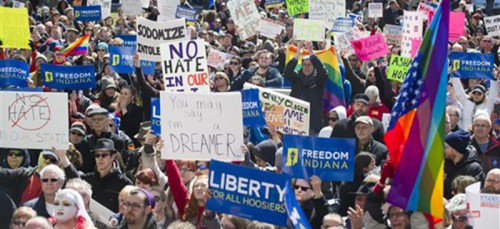
Furor in Indiana finally died down, as the states’ legislators just amended the stringent Religious Freedom Restoration Act (RFRA), which would’ve broadly protected private business owners’ right to discriminate against lesbian, gay, bisexual, transgender or questioning (LGBTQ) customers.
Although discrimination against the LGBTQ community is nothing new, the magnitude of furor over the law was nearly unprecedented. Outcry over the original law came from people nationwide, and institutions ranging from Yelp to the City of Seattle had boycotted businesses in the entire state.
RFRA was revised within a week of its proposal to provide protections for LGBTQ customers from service denail that was previously justified under “religious freedom.” Countering outcry from opposing conservative groups has since occurred, seeking to insulate the state from the progress of the LGBTQ movement.
Although the issue has often been portrayed as a hard conflict between liberals and religiously-driven conservatives, the truth was not necessarily as simple. In particular, many Christian-oriented groups – such as the Disciples of Christ – joined other LGBTQ advocates in their boycotts or outcry against Indiana’s former law.
Scott Kelley, a director of DePaul’s Mission and Values, discussed generalized perceptions of Christians.
“I don’t think there is an ‘average’ Christian,” Kelley said. “It is not a single religion, but a large overarching description of a variety of different traditions, each with its own history of interpreting scripture, adhering to traditions, participating in, avoiding, or trying to transform the broader culture. I don’t think one can really say anything significant about an ‘average’ Christian.”
Statistics reflect this sentiment: A study from the Public Religion Research Institute found that Catholics’ approval of gay marriage has grown from 35 percent to 57 percent of Catholics between 2003 to 2013. Similarly, approval from White Mainline Protestants has grown from 36 to 62 percent over the same time period.
Some suspect the backing of Indiana’s RFRA was not necessarily justified through religious protection; rather, it may have been enacted for political purposes.
“I don’t think religion is any excuse to discriminate,” Shelley Mesch, a DePaul Junior and practicing Catholic, said. “This law (was) just allowing bigotry by claiming their religion justifies it. These laws are designed to protect the religious freedom of the disenfranchised and the smaller sects; instead the conservative Christians in the Indiana legislature are using it against those of different beliefs to further marginalize them.”
Kelley similarly agrees on the potential politicization of the issue.
“It is important to keep in mind that we are ramping up for another presidential election, so it seems only natural to ask why this law is being passed now and what either side hopes to gain politically from it,” he said.
Politicization of moral issues remains a key aspect when considering the compatibility between Christianity and a progressive society. Regardless of how an individual person believes about the morality of gay orientation, many question how large of a role such moral viewpoints should play in the creation of legislation within a civil society. Such debates will likely play a key role through the future in the 20 other states that boast (albeit weaker) versions of religious freedom protection laws.
“From a Roman Catholic perspective, Church doctrine about gay marriage says nothing about how a state should legislate or apply these principles,” Kelley said. “Catholic social thought is not a blueprint for running a country, and Papal teaching has always maintained that position. It is up to individuals, communities, and states to determine how to interpret and apply moral principles, recognizing fully that the American legislative process is an expression of an American culture that is religiously diverse.”
“Some think that everything that is immoral ought to be illegal, which is foolish, while others think everything that is not illegal must be morally permissible, which is knavish,” Kelley continued. “From this perspective, the Religious Freedom Law in Indiana, it seems to me, is foolish – regardless of one’s moral judgment about a particular lifestyle or orientation.”

